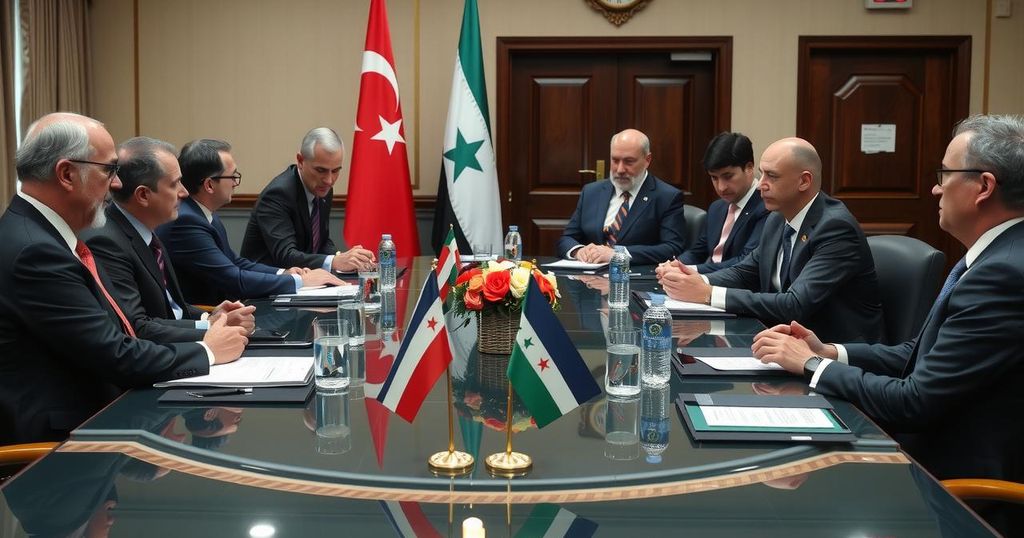World news
AGENCE FRANCE - PRESSE, ASIA, BASHA, BASHAR AL - ASSAD, CONFLICT, ERDOGAN, EUROPE, EUROPE/ASIA, FIGHTER JETS, HA, HAKAN FIDAN, HAMA, IRAN, MILITARY, REC, REUTERS, RUSSIA, SYRIA, SYRIAN CIVIL WAR, SYRIAN CONFLICT, SYRIAN NATIONAL ARMY, U. S. - BACKED SYRIAN DEMOCRATIC FORCES, UKRAINE, WAR
Marisol Gonzalez
0 Comments
Turkey, Russia, and Iran to Discuss Syrian War Amid Rebel Advances
Turkey, Russia, and Iran will meet in Qatar to discuss responses to HTS’s recent advances in Syria, notably the captured cities of Aleppo and Hama. This dialogue aims to address the shifting dynamics of the conflict post-civil war while considering implications for regional stability and humanitarian concerns.
This weekend, Turkey, Russia, and Iran are poised to convene in Qatar amid escalating tensions in Syria, where recent rebel advances by the Islamist group Hayat Tahrir al-Sham (HTS) have disrupted the established dynamics of the civil war. The talks, occurring on the sidelines of the Doha Forum, will be attended by Turkey’s Foreign Minister Hakan Fidan along with his Russian and Iranian counterparts and aim to address the implications of the fighting over cities like Aleppo and Hama, both of which have strategic significance.
The Astana process, initiated in 2017 by Turkey, Russia, and Iran, was originally designed to seek a resolution to the Syrian conflict. Past collaborations have led to relative calm, but the recent offensives have thrown previous gains into jeopardy. The Islamist force HTS captured Aleppo and advanced toward Hama, prompting a swift response from the involved nations.
Russian President Vladimir Putin and Turkish President Recep Tayyip Erdogan discussed the situation, emphasizing the necessity for stability in Syria. However, the ongoing conflicts have further complicated matters, especially concerning Kurdish forces in northern Syria that Turkey perceives as a threat. The U.S. remains active in the region, supporting the Syrian Democratic Forces (SDF), while the ongoing tensions and a surge in ISIS activity represent a significant concern for global security during this precarious time.
Former U.S. officials express skepticism regarding the ability of Russia and Iran to compel Assad to negotiate meaningful solutions amid shifting battlefield scenarios. With Turkey hosting millions of Syrian refugees, the potential for renewed violence raises concerns of another refugee crisis. A quick ceasefire could provide opportunities for refugees to return, emphasizing the delicate balance of power and the intricate web of alliances at play in Syria’s ongoing conflict.
The Syrian civil war, which erupted in 2011, has drawn in various regional powers, including Turkey, Russia, and Iran, each with vested interests. The Astana process was a diplomatic initiative aimed at finding common ground among these nations while addressing the complex landscape of support for Syrian President Bashar al-Assad and various rebel factions. Recent advances by HTS have disrupted previously established front lines, raising urgent concerns over shifting control and the potential for increased instability. Turkey is particularly apprehensive about Kurdish forces in the region that may pose security threats, while Russia and Iran face challenges in supporting Assad due to distractions from other regional conflicts. The interplay among these nations is critical for any progress towards resolution or escalation of tensions.
In summary, the upcoming talks between Turkey, Russia, and Iran represent an essential effort to address the rapid shifts in the Syrian conflict precipitated by recent advances by HTS. The complexities surrounding territorial integrity, refugee crises, and the influence of Kurdish forces underscore the urgency of a diplomatic resolution. However, historical alliances and rivalries complicate the potential for achieving a consensus on the future of Syria, thus maintaining a precarious status quo laden with risks.
Original Source: www.voanews.com




Post Comment